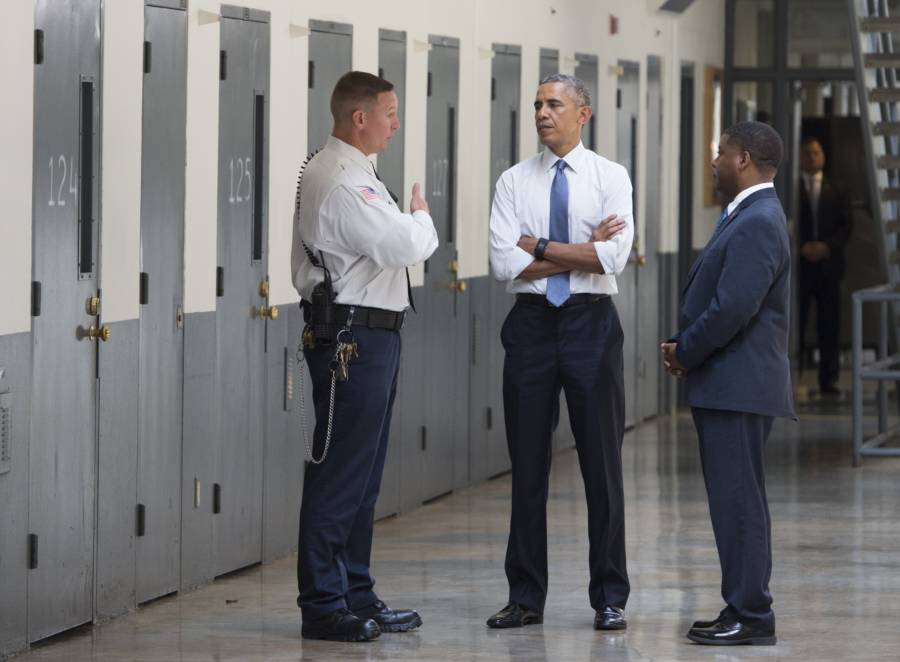The Disappearance Of Conjugal Visits In The United States

Wikimedia CommonsThe front gate of Mississippi State Penitentiary, also known as “Parchman Farm,” today.
In 2015, Mississippi — the first state to allow conjugal visits about a hundred years before at Parchman Farm — ended conjugal visits in the state, seemingly in response to dramatically shifted public opinion.
This shift in opinion came not because the public suddenly recognized that the visits had from their inception been used to control a given population — and were founded upon racist thinking — but because Mississippians thought that conjugal visits are a symptom of a state that “does too much” for criminals.
As retired prison warden Arthur Leonardo told The Marshall Project, a non-profit site dedicated to journalism concerning criminal justice reform, “There’s this feeling that we shouldn’t be doing anything for them.” Voters “get upset when they find out inmates get health care! Health care is a curse word!”
The same sentiment inspired Richard Bennett, a state representative in Mississippi, to push for a ban on the practice. “You are in prison for a reason,” Bennett told The New York Times. “You are in there to pay your debt, and conjugal visits should not be part of the deal.”
Some also fear that conjugal visits can be dangerous — and on rare occasions, they are.
In 2010, a 50-year-old prisoner in Germany killed his 46-year-old girlfriend during a conjugal visit. After initiating correspondence with him while he was in prison, she became the man’s girlfriend and participated regularly in six-hour unsupervised visits. The inmate, who had been imprisoned for nearly two decades for the rape and murder of a child, stabbed her with a steak knife and strangled her during one visit.
In 2013, a prisoner jailed in Afghanistan for killing his wife’s mother, brother, and sister, murdered his wife during a conjugal visit, allegedly for being unfaithful to him.
Because the chances of dangers like this are so statistically slight, advocates for conjugal visits remain undeterred in their stance, continuing to claim that these visits are in fact worthwhile — and for several important reasons.

SAUL LOEB/AFP/Getty ImagesUS President Barack Obama, alongside Charles Samuels (right), Bureau of Prisons Director, and Ronald Warlick (left), a correctional officer, tours a cell block at the El Reno Federal Correctional Institution in El Reno, Oklahoma, July 16, 2015. Obama is the first sitting U.S. President to visit a federal prison, in a push to reform one of the most expensive and crowded prison systems in the world.
One study of a 1980 family visitation program in New York found that released prisoners who had conjugal visits returned to prison 67 percent less often than those who had not had those visits. This ought to be of concern in the U.S., which has both a high recidivism rate and equally large prison populations.
Regarding how conjugal visits change dynamics within prisons, a 2012 study at Florida International University examined whether conjugal visitation reduces prison rape, and found that states permitting conjugal visitation have significantly fewer instances of rape and other sexual offenses in their prisons.
Furthermore, the study found that of five states where conjugal visits were legal at the time, “while sexual violence occurred in state prison systems that prohibit conjugal visits at an average rate of 226 incidents per 100,000 prisoners, it occurred almost four times less frequently in the five states that permitted such visits – 57 per 100,000 prisoners.”
Still, studies like these often take one thing for granted: that everyone agrees that the purpose of prisons is not so much to punish criminals as it is to reduce crime, which some argue is more likely to occur if prisoners maintain their familial, spousal, and parental connections with the outside world.
Until the U.S. prison system agrees, however, it seems likely that the country will differ from much of the civilized world (and, ironically, a number of places many Americans likely consider to be uncivilized) on the matter of conjugal visits.
Next, step inside the five worst prisons on the planet. Then, discover just how private prisons are making billions by transforming the justice system into big business.





